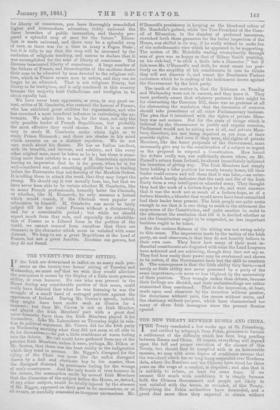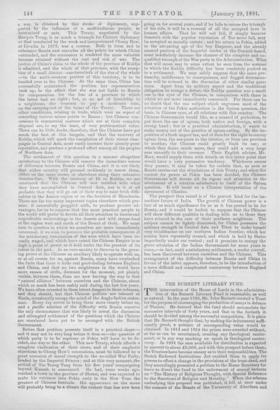THE NEW TREATY BETWEEN RUSSIA AND CHINA.
THE Treaty concluded a few weeks ago at St. Petersburg,. and ratified by telegraph from Pekin, promises to furnish a settlement of the difficulty which has been long pending between Russia and China. Of course, everything will depend upon the full and proper execution of the clauses of this Treaty, but, should they be complied with in an honourable manner, we may with some degree of confidence assume that the war-cloud which has so long hung suspended over Northern Asia, whore the Russians and the Chinese have stood for three years on the verge of a conflict, is dispelled ; and also that it is unlikely to return, at least for some time. If we assume this much with confidence, it is simply because both the Chinese Government and people are likely to rest satisfied with the terms, as revealed, of this Treaty. Everything the Pekin .authorities have demanded, and a .great .deal more than they expected to obtain without a war, is obtained by this stroke of diplomacy, sup- ported by the influence of a multitudinous people, as determined as ants. This Treaty, negotiated by the Marquis Teeng, is as much a triumph for Chinese diplomacy as that concluded by the weak and inexperienced Chung How, at Livadia in 1879, was a reverse. Both in form and in substance Russia now concedes all the points for which China contended, and the concession is rendered the more valuable because attained without the cost and risk of war. The justice of China's claim to the whole of the province of Kuldja is admitted, and the whole of that province, with the excep- tion of a small district—one-twentieth of the size of the whole —in the north-western portion of this territory, is to be handed over to the Chinese, At the same time, China has successfully maintained the position her representatives took up, to the effect that she was not liable to Russia for compensation for the loss of a province to which the latter had no right ; but, as an act of friendship to a neighbour, she consents to pay a moderate sum, on the carrying-out of the terms of the Treaty. There are other conditions, relating to trade, which wear an aspect of conceding various minor points to Russia ; but Chinese con- cessions in commercial matters which are at their complete disposal are, to say the least, of very problematical value. There can be little doubt, therefore, that the Chinese have got much the best of this bargain, and that the recovery of Kuldja, which will mark the completion of their recent cam- paigns in Central Asia, must vastly increase their already great reputation, and produce a profound effect among all the peoples of Northern Asia.
The settlement of this question in a manner altogether satisfactory to the Chinese will remove the immediate causes of difference between Russia and China, and it is not likely that either country will proceed recklessly to renew them, either on the same scene, or elsewhere along their extensive frontier-line. With the recovery of Di or Kuldja, we are convinced that the Chinese will rest satisfied with what they have accomplished in Central Asia, nor is it at all probable that they will go out of their way to raise fresh diffi- culties in the Amour region or on the frontiers of Manchuria. There are far too many important topics elsewhere which pro- mise, if successfully grappled with, to produce greater ad- vantages, for us to suppose that the most practical people in the world will prefer to devote all their attention to barren and unprofitable undertakings, in the deserts and wild steppe-land of the region west and north of the Desert of Gobi. We must turn to quarters in which we ourselves are more immediately concerned, if we wish to perceive the probable consequences of the satisfactory termination of the wars which have been re- cently waged, and which have raised the Chinese Empire to as high a point of power as it held under the the greatest of its rulers in the past. In an over-anxiety to discover in the grow- ing power of the Chinese an auxiliary likely to operate with us, or at all events for us, against Russia, many have overlooked the facts that there is little real good-feeling between England and China, and that no two neighbours in the world have more causes of strife, dormant for the moment, yet plainly visible, between them, than are now barring the way to that " natural alliance " between ourselves and the Chinese, about which so much has been rashly said during the last few years. We have often reverted to these latent dangers in these columns, and they should, but that Chinese politics are tabooed at Simla, occasionally occupy the mind of the Anglo-Indian states- man. Every day serves to bring them more clearly before us, and a pacific solution of the difficulty with Russia removes the only circumstance that was likely to arrest the discussion and attempted settlement of the questions which the Chinese are convinced have yet to be arranged with the British Government.
Before that problem presents itself in a practical shape— and it may not be very long before it does so—the question of which party is to be supreme at Pekin will have to be de- cided, one way or the other. This new Treaty, which affords a complete vindication of their views, and of their emphatic objections to Chung How's concessions, must be followed by a great accession of moral strength to the so-called War Party, headed by the Imperial Princes ; and at this very moment, the arrival of Tso Tsung Tang from his five years' campaigning beyond Kaneuh is announced. He had, some weeks ago, reached a town in the province of Shensi, and was expected to make his entrance into Pekin early in the New Year, the greatest of Chinese festivals. His appearance on the scene will probably bring to a climax the contest that has now been
going on for several years, and if he fails to secure, the triumph of his side, it will be a reversal of all the accepted laws in human affairs. That he will not fail, if simply because Generals with the popular reputation of Tso never fail, may be accepted as morally certain ; and his return to Pekin, added to the advancing age of the boy Emperor, and the already assured position of the Imperial uncles at the Council-board, must indefinitely increase the chances of the complete and un- qualified triumph of the War party in the Administration. What that will mean may to some extent bo seen from the manner in which the Kuldja difficulty has been resolutely pushed on to a settlement. We may safely suppose that the same per- tinacity, indifference to consequences, and dogged determina- tion will be evinced in the discussion of other similar ques- tions. Apart from its military aspect and the traditional obligation to avenge a defeat, the Kuldja question was a small one in the eyes of the Chinese, in comparison with those in which we are more immediately concerned. For there can be no doubt that the one subject which engrosses most of the attention of the Pekin authorities is the Opium question, the basis, in Chinese eyes, of all relations with this country. The Chinese Government would like, as a counsel of perfection, to put down the use of opium, both native and foreign, with a strong hand ; but as a practical administration, it wants to make money out of the practice of opium-eating. By the im- position of a fresh import tax, and of dues for the right to convey opium from the sea-ports to the interior, or from one province to another, the Chinese could greatly limit its use ; or which they desire much more, they could add a very large sum annually to their revenue. Their English adviser, Mr. Hart, would supply them with details on this latter point that would have a very persuasive tendency. Whichever course they pursue, it may be taken for certain that, as soon as Russia carries out the stipulations of this Treaty, and when the contest for power at Pekin has been decided, the Chinese Government will devote all its vigour and attention to the attainment of a solution satisfactory to itself of the Opium question. It will insist on a Chinese interpretation of the agreement of Cheefoo.
The prospect thus raised is of the gravest kind for the im- mediate future of India. The growth of Chinese power is a fact of as much significance for us as it has proved to be for Russia, and it would be foolish to , suppose that the Chinese will show different qualities in dealing with us to those they have evinced in the case of their northern neighbour. The subject cannot be lightly dismissed, for China possesses the military strength in Central Asia and Tibet to make herself very troublesome on our northern Indian frontier, which her armies have repeatedly crossed, and which is held by States imperfectly under our control ; and it promises to occupy the grave attention of the Indian Government for some years to come,—in fact, until a satisfactory settlement, a ?nodes viveadi, has been discovered between ourselves and the Chinese. This arrangement of the difficulty between Russia and China in favour of the latter appears, therefore, to be the introduction of a more difficult and complicated controversy between England and China.







































 Previous page
Previous page